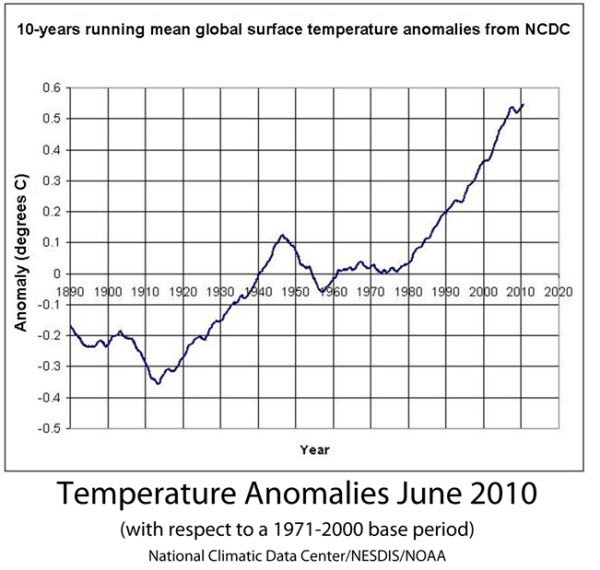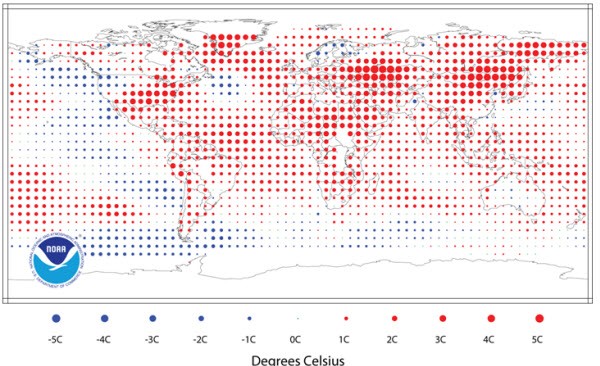Earth and paleo-climate scientist at ANU, Dr Andrew Glikson writes: This year is shaping up as the warmest in the instrumental record, as recorded by the National Climate Data Centre (NCDC — the worlds largest active archive of weather data), NASA Goddard Institute of Space Science (GISS), Hadley-Met/Climate Research Unit, Remote Sensing Satellite survey (RSS) and Microwave Sounding Unit (MSU).


According to an article by National Oceanic and Atmospheric Association (NOAA), released last month on July 15:
“Last month’s combined global land and ocean surface temperature made it the warmest June on record and the warmest on record averaged for any April-June and January-June periods … Worldwide average land surface temperature was the warmest on record for June and the April-June period, and the second warmest on record for the year-to-date (January-June) period, behind 2007.”
The monthly analysis from NOAA is based on records going back to 1880.
But you will not read about it in much of the media. A string of extreme weather events monitored by NASA tell the story, including:
- Last month saw the hottest temperature on record for Asia, with 53C in Pakistan. The mega-floods in this part of the world are the result of the increased capacity of the warming atmosphere to hold moisture, precipitated when the humid air masses rise above the Himalaya.
- Moscow has also been recording temperatures of 37.4 degrees C, the monthly anomaly will be a record of around +7.5 degrees C, with a death toll reaching 2000 people. Extreme temperatures, reaching 40 degrees C in Moscow, have set large parts of Russian forests and wheat belts on fire.
- Beijing had it hottest day on record earlier in the month, 40.6C.
- Japan scored a 39.4C on 22nd July.
- Hundreds of maximum and minimum temperature records have been broken across the U.S. and Canada in the last two months.
- Raging wildfires broke out July 29 just south of Los Angeles, CA, forcing mandatory evacuations and major firefighting response.
Closer to home, it has been very warm across northern, north-western and some inland parts of Australia over recent weeks. We broke quite a few minimum temperature records — including Darwin, which broke its July minimum record by 1.5 degrees C.
Though most of what you would read about in the media is the manufactured Climategate email story, which tries to obfuscate climate science and cast doubt on the integrity of climate scientists. This is despite recent investigations showing climate scientists right, as stated:
“On the specific allegations made against the behaviour of CRU scientists, we find that their rigour and honesty as scientists are not in doubt.” … ”We did not find any evidence of behaviour that might undermine the conclusions of the IPCC assessments.”
The newspapers that gave greatest play to the allegations tended to give less attention to these findings. The columnists who gave greatest vent to their indignation have not made any revisions or corrections, let alone apologised to the scientists whose integrity they so sweepingly impugned. An article by Rodney Tiffen in the Brisbane Times summed up the media outrage, followed by silence, well.
Those who would like to see themselves as “sceptics”, but commonly present climate plots which inexplicably depart in essential detail from original datasets measured by the worlds premier climate research organizations, as well as ignore the basic physics and chemistry of the atmosphere, would suggest the current extreme weather events are “natural” and not to do with human Carbon emissions.
By contrast, consistent with the Stefan-Boltzmann and Krichhoff laws of infrared radiation, these events manifest the increase in energy (temperature) levels of the atmosphere and oceans, consequent on the emissions of about 370 billion tons of carbon since 1750, currently at a rate of about 2 ppm per year, reaching 391 ppm, namely near 40% higher that during the last 10,000 years, when agricultural cultivation became possible thanks to stabilization of the Holocene climate.







Crikey is committed to hosting lively discussions. Help us keep the conversation useful, interesting and welcoming. We aim to publish comments quickly in the interest of promoting robust conversation, but we’re a small team and we deploy filters to protect against legal risk. Occasionally your comment may be held up while we review, but we’re working as fast as we can to keep the conversation rolling.
The Crikey comment section is members-only content. Please subscribe to leave a comment.
The Crikey comment section is members-only content. Please login to leave a comment.